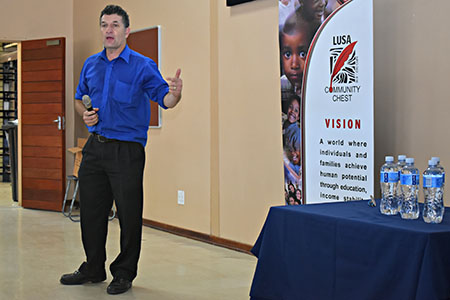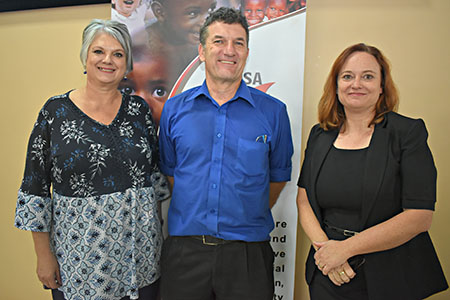The event saw Veronica Cronje, executive director of Lusa Community Chest, take to the lectern to address members of the campus community on the various ways in which local communities can make a positive impact on food and nutrition security.
As a community development specialist, Veronica’s lecture focused on practical ways to improve lives and create long-term social change.
To illustrate the dire state of global food insecurity, Veronica shared several startling research findings as conducted by the United Nations. These findings include:
- That generating three centimetres of quality top soil takes 1 000 years;
- If the current rates of soil degradation continue all of the world’s top soil could be gone within the next 60 years; and
- About a third of the world’s farmable soil has already been degraded.
The causes of soil destruction include chemical-heavy farming techniques, deforestation – which increases erosion, and global warming.
Veronica said that now is the time to act and that communities should stop waiting for the government or policymakers to address issues pertaining to food insecurity.
“Each and every one of us can, by making conscious decisions to act environmentally smart make an impact. This impact, once multiplied, will have a ripple effect on local communities, the country and eventually the continent,” she explained.
The two most important traits needed to facilitate environmentally smart custodianship are, according to Veronica, mindfulness and resilience. “We are confronted with a dilemma on a global scale and as such, for our own preservation, we need to snap out of survival mode and come to terms with reality.”
What you do today will affect your tomorrow
During the lecture, Veronica focused on two interventions to counteract food insecurity, namely: farming with aquaponics and edible mushroom cultivation. Aquaponics consists of an integrated system or relationship between farmed fish and growing vegetables. Fish waste provides valuable nutrients to the plants while the plants, in return, absorb the waste and clean the water for the fish.
Edible mushroom cultivation on the other hand represents a wellspring of nourishment sustenance. She explained that even landless individuals can cultivate mushrooms indoor and that decaying material – of which huge amounts of natural waste are create every year, can be reused as a substrate for mushroom cultivation.
“When we act environmentally smart we realise that waste is not waste until it is wasted,” said Veronica.
She concluded by saying that creative communities and companies can contribute to sustainability interventions – especially in the field of waste management – by implementing novel environmental solutions (such as aquaponics and edible mushroom cultivation).
During the event the Vanderbijlpark branch of Protea Books exhibited their comprehensive range of books and study material pertaining to sustainable development and food security. They also had a lucky draw and several students walked away with book vouchers.
* Lusa Community Chest is a non-profit and public benefit organisation that leads, supports and participates in inclusive community efforts that build capacity and mobilise resources to improve lives and create long-term social change.

Cobus Olivier, a lecturer from the Faculty of Education, coordinated the campus’s World Food Day activities.

Anne-Marie Oosthuizen (Protea Books, Vanderbijlpark), Cobus Olivier and Veronica Cronja (Lusa Community Chest).
